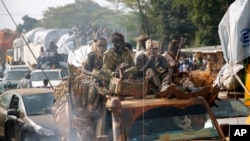GENEVA —
An investigation by U.N. human rights monitors has found that on March 29, Chadian soldiers fired on civilians in the Central African Republic's capital, killing and wounding dozens. The investigators say the soldiers were likely on a mission to evacuate Muslims from a volatile area.
Information gathered by the U.N. investigation team shows soldiers from the Chadian national army entered the C.A.R. capital, Bangui, in several pick-up vehicles on March 29. The investigators say the soldiers went to the neighborhood known as PK12, one of two main districts where thousands of Muslims are virtually trapped.
U.N. human rights spokesman Rupert Colville says several sources have told the investigating team the Chadian force had entered Bangui to extract remaining Chadians and other Muslim inhabitants. He says the soldiers apparently were trying to save these people from attacks by Christian anti-balaka militia.
“As soon as the convoy of the Chadian National Army reached the PK12 market area around 3:00 p.m., it allegedly opened fire on the population without any provocation. As people fled in all directions in panic, the soldiers continued to fire indiscriminately. At the time of the shooting, the market was full of many people, including many young girls and women buying and selling produce," said Colville.
The human rights team says the Chadian force’s action appears to have been totally disproportionate as they were shooting in a crowded market full of unarmed civilians.
Preliminary findings put the number of those killed at around 30, with more than 300 seriously wounded, including children, people with disabilities, pregnant women and elderly people. The investigators concluded these people were an easy mark as they were less able to run for their lives.
Most of the wounded and some of the dead were taken to two medical centers in Bangui. Colville says the investigators interviewed survivors there and also spoke to people in the neighborhood where the shootings took place.
He says in a VOA interview that the Chadian soldiers were not part of MISCA, the African Union-led peacekeeping force in Central African Republic. He says they were part of Chad’s regular national army.
“There have been Chadian soldiers earlier as well as now operating inside C.A.R. In many cases, they have saved lives. They have evacuated both people of Chadian nationality and also other Muslims out to Chad. I think we should note that in many cases they would have saved lives by doing that," said Colville.
Colville notes MISCA is composed of soldiers from several African nationalities, including Chadians, Congolese, Rwandans and Burundians. He says the shooting spree in the market was stopped when Congolese MISCA forces arrived and intervened.
Chad has announced it plans to withdraw around 850 of its troops from MISCA, citing an allegedly malicious campaign targeting its soldiers. Chad’s withdrawal is seen as a major blow to U.N. efforts to deploy a force of 10,000 soldiers in the C.A.R. to end sectarian violence in the country.
Information gathered by the U.N. investigation team shows soldiers from the Chadian national army entered the C.A.R. capital, Bangui, in several pick-up vehicles on March 29. The investigators say the soldiers went to the neighborhood known as PK12, one of two main districts where thousands of Muslims are virtually trapped.
U.N. human rights spokesman Rupert Colville says several sources have told the investigating team the Chadian force had entered Bangui to extract remaining Chadians and other Muslim inhabitants. He says the soldiers apparently were trying to save these people from attacks by Christian anti-balaka militia.
“As soon as the convoy of the Chadian National Army reached the PK12 market area around 3:00 p.m., it allegedly opened fire on the population without any provocation. As people fled in all directions in panic, the soldiers continued to fire indiscriminately. At the time of the shooting, the market was full of many people, including many young girls and women buying and selling produce," said Colville.
The human rights team says the Chadian force’s action appears to have been totally disproportionate as they were shooting in a crowded market full of unarmed civilians.
Preliminary findings put the number of those killed at around 30, with more than 300 seriously wounded, including children, people with disabilities, pregnant women and elderly people. The investigators concluded these people were an easy mark as they were less able to run for their lives.
Most of the wounded and some of the dead were taken to two medical centers in Bangui. Colville says the investigators interviewed survivors there and also spoke to people in the neighborhood where the shootings took place.
He says in a VOA interview that the Chadian soldiers were not part of MISCA, the African Union-led peacekeeping force in Central African Republic. He says they were part of Chad’s regular national army.
“There have been Chadian soldiers earlier as well as now operating inside C.A.R. In many cases, they have saved lives. They have evacuated both people of Chadian nationality and also other Muslims out to Chad. I think we should note that in many cases they would have saved lives by doing that," said Colville.
Colville notes MISCA is composed of soldiers from several African nationalities, including Chadians, Congolese, Rwandans and Burundians. He says the shooting spree in the market was stopped when Congolese MISCA forces arrived and intervened.
Chad has announced it plans to withdraw around 850 of its troops from MISCA, citing an allegedly malicious campaign targeting its soldiers. Chad’s withdrawal is seen as a major blow to U.N. efforts to deploy a force of 10,000 soldiers in the C.A.R. to end sectarian violence in the country.




